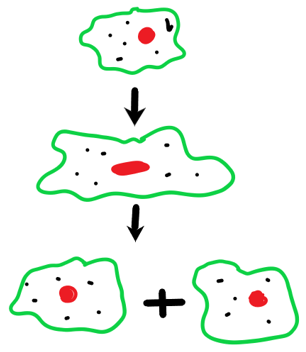This set of Class 12 Biology Chapter 1 Multiple Choice Questions & Answers (MCQs) focuses on “Reproduction in Organisms”. These MCQs are created based on the latest CBSE syllabus and the NCERT curriculum, offering valuable assistance for exam preparation.
1. What is the period from birth to natural death of an organism known as?
a) Life span
b) Senescence
c) Age
d) Life cycle
View Answer
Explanation: The period from birth to natural death of an organism is known as its life span. It varies from few years to thousand years, depending on the organism.
2. Reproduction is defined as a biological process of organisms giving rise to young ones or offspring.
a) True
b) False
View Answer
Explanation: Reproduction is a biological process carried out by organisms in order to keep their species alive. It is a process carried out generation after generation. There are many ways of reproducing. They are divided into sexual and asexual reproduction.
3. What is the term used to describe genetic and morphologic similarities between different individuals?
a) Offspring
b) Clone
c) Gamete
d) Cell
View Answer
Explanation: Clones are organisms with the same genetic and morphological similarities. It can be carried out naturally and artificially. Asexual reproduction is an example of natural cloning. Artificial cloning is carried out in labs. In biotechnology cloning can refer to DNA fragments or cell copies.
4. What type of reproduction does the image depict?

a) Vegetative propagation
b) Fragmentation
c) Budding
d) Binary fission
View Answer
Explanation: Single celled organisms undergo binary fission. The parent cell splits into 2 daughter cells. They produce identical cells.
5. Which plant is the “terror of Bengal”?
a) Cereus
b) Corpse plant
c) Water hyacinth
d) Cactus
View Answer
Explanation: Water hyacinth is a water weed that grows on still water. It drains out all the oxygen from the water bodies which is extremely fatal for the marine organisms. It is very difficult to get rid of them because even if leaves behind a single bud, it will start multiplying at a great speed.
6. From where do rhizomes arise?
a) Roots
b) Leaves
c) Buds
d) Nodes
View Answer
Explanation: The site of origin in rhizomes is from nodes present in modified stems. Examples of plants that give rise to new plantlets from nodes: potatoes (the nodes on potatoes are also called nodes) and ginger.
7. How does Bryophyllum reproduce?
a) Leaves
b) Stem
c) Roots
d) Nodes
View Answer
Explanation: Adventitious buds arise from the margin of the leaves in Bryophyllum. Those buds give rise to new plants that fall of when they are capable enough to grow on their own. This unique ability has been exploited by the gardeners and farmers.
8. Sexual reproduction is better than asexual reproduction.
a) False
b) True
View Answer
Explanation: Sexual reproduction is better than asexual reproduction. This is mostly because sexual reproduction brings about variation in the offspring which brings about mutations and helps it adapt to the changes in the environment. On the other hand, asexual reproduction is a fast process but the offspring that is produced has no variation which makes it difficult for it to adapt to even small changes.
9. Fusion of gametes forms a zygote.
a) False
b) True
View Answer
Explanation: The process of fertilization is described as the fusion of two gametes of opposite sex. This fusion forms a zygote or an egg. Its genome is a combination of DNA in 2 gametes. Th chromosome number in each is 23 (haploid). On fusion it becomes a diploid cell (23 + 23 = 46).
10. What is the period of growth known as in plants?
a) Senescence
b) Juvenile phase
c) Reproductive phase
d) Vegetative phase
View Answer
Explanation: The general term for the period of growth is known as juvenile phase. In plants it is known as the vegetative phase. The end of juvenile phase marks the beginning of reproductive phase.
More MCQs on Class 12 Biology Chapter 1:
- Chapter 1 – Reproduction in Organisms MCQ (Set 2)
- Chapter 1 – Reproduction in Organisms MCQ (Set 3)
- Chapter 1 – Reproduction in Organisms MCQ (Set 4)
- Chapter 1 – Reproduction in Organisms MCQ (Set 5)
To practice all chapters and topics of class 12 Biology, here is complete set of 1000+ Multiple Choice Questions and Answers.
If you find a mistake in question / option / answer, kindly take a screenshot and email to [email protected]
- Check Class 12 - Biology Books
- Practice Class 12 - Physics MCQs
- Practice Class 11 - Biology MCQs
- Practice Class 12 - Chemistry MCQs
- Practice Class 12 - Mathematics MCQs
